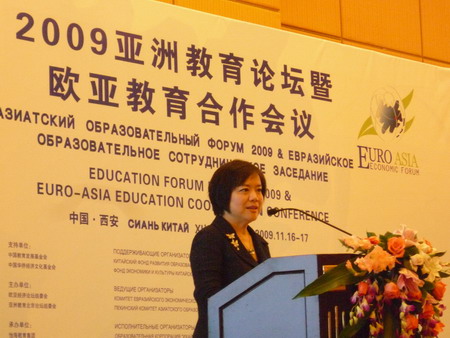Chingling Tong had arrived in Beijing at half past five in the morning and then flown to Xi'an, but her face showed no fatigue. Twenty years after moving to America, she still speaks fluent Mandarin.
|
 Chiling Tong speaks at the Euro-Asia Education Forum in Xi'an. [chinadaily.com.cn]
Chiling Tong speaks at the Euro-Asia Education Forum in Xi'an. [chinadaily.com.cn]  |
This energetic lady devotes herself to the non-profit organization International Leadership Foundation, more widely known as ILF. It was founded by her husband, Joel Szabat, in 2000. Ms. Tong is its chief executive.
ILF, according to Tong, helps Asian students studying in the United States get internships in the White House, preparing them for possible futures in politics.
"The road of politics is really long," she said. "When chance falls on you, you'd better be prepared. The mission of ILF is to develop a pool of talents, and open more opportunities to these students."
"Not all the students can actually work in the White House. Still, they are doing some paperwork and organizing memos in the government. They can choose what they do according to their own interest."
Indeed, the organization she is now managing has, in some students' own words, changed their life. It helped them experience real politics, and enhanced their career opportunities as government officials, business executives or entrepreneurs.
"I feel really happy when I see their progresses." Tong smiled.
Tong went to America when she graduated from Chinese Culture University in Taiwan, China in 1984, and got an MBA at California State University in Long Beach. Recalling the first several years in the US, she thought the most difficult part was to blend in with the students around her.
"There are distinctions between written and spoken English. US students like talking about sports, TV shows, fashion, and you would feel unfamiliar with their topics. Even now, Chinese students are faced with the same problem. They might be perfect in their courses, but there is a kind of isolation," she said.
From a civil servant in California to an influential statesperson in Bush's administration is a long way even for men. Tong also had to go through ups and downs as a Chinese woman.
"Being a Chinese woman working in America is no easy job," she said. "We have to balance between not only family and career, but also Western and Eastern culture. Men can inject all their energy into work, while we can't. Women are careful, we pay every possible attention to our families, and we can't be as aggressive as men - we have to stay reserved."
"If we look at the whole picture, it is still a man's world," she said. "But provided opportunities, women can do great."
What about Xi'an impressed her most? She thought for a few seconds.
"I can come across friends I lost connections with a dozen years ago. People crowd into this city."


